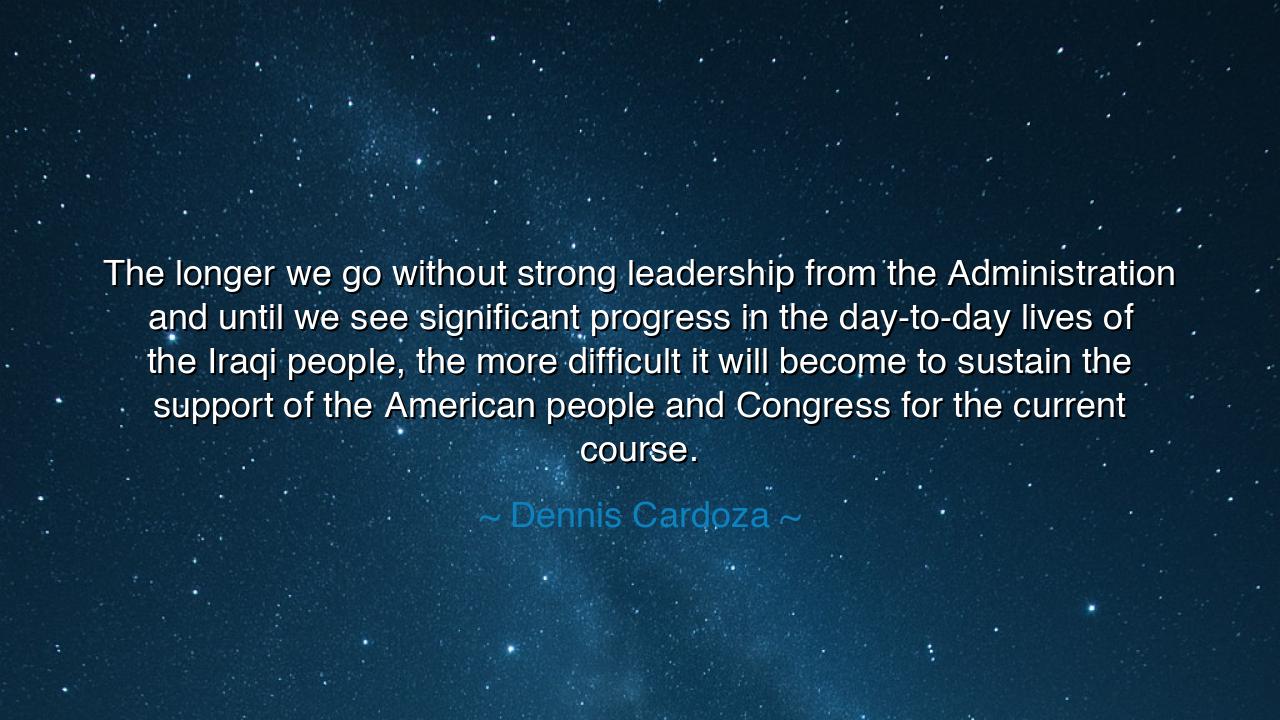
The longer we go without strong leadership from the
The longer we go without strong leadership from the Administration and until we see significant progress in the day-to-day lives of the Iraqi people, the more difficult it will become to sustain the support of the American people and Congress for the current course.






In these words, Dennis Cardoza speaks with the gravity of one who has seen the tides of war, politics, and human patience collide. “The longer we go without strong leadership from the Administration and until we see significant progress in the day-to-day lives of the Iraqi people, the more difficult it will become to sustain the support of the American people and Congress for the current course.” Beneath this statement lies a truth older than nations themselves — that leadership and legitimacy walk hand in hand, and when one falters, the other soon fades. His words, though spoken in the context of the Iraq War, carry the eternal rhythm of history: when leaders fail to show both vision and results, the hearts of the governed grow weary, and the will to endure dissolves like mist before the morning sun.
To understand the spirit of Cardoza’s warning, we must look to the early years of the Iraq conflict, when the United States found itself entangled in a war that demanded not only military might but moral clarity. The Administration of that time faced the monumental task of rebuilding a nation shattered by dictatorship and invasion. Yet as months turned to years, promises of progress faded beneath headlines of unrest, sectarian violence, and uncertainty. Cardoza’s words, then, were not the cry of a critic seeking blame, but the lament of a statesman seeking accountability. He saw that without visible change in the lives of ordinary Iraqis — without water flowing, schools reopening, and security returning — both the foreign mission and domestic faith in it would wither. For in the realm of leadership, results are the nourishment of trust, and trust, once starved, dies swiftly.
This truth has echoed through every age. In the twilight of the Roman Republic, Cicero warned his people that when leaders chase ambition instead of service, the republic rots from within. Likewise, during the long wars of Europe, kings who sent their sons to die for glory without purpose soon found their crowns heavy and their thrones trembling. The ancients understood that leadership is not sustained by rhetoric or might, but by the visible betterment of those who follow. When leaders fail to translate grand vision into tangible mercy, the governed — weary of speeches and promises — turn their gaze elsewhere.
Cardoza’s quote carries the tone of civic wisdom, not merely political critique. He reminds us that even the strongest armies cannot hold what the heart of the people no longer believes in. For the American public, the Iraq War became not just a military endeavor, but a test of moral endurance. The images of suffering abroad and uncertainty at home eroded the belief that the cause was noble or the plan just. Without clear direction and compassionate governance, the mission lost its soul — and in the absence of soul, no strategy can stand. Thus, strong leadership, as Cardoza calls for, is not about domination or command, but about vision grounded in humanity — leadership that sees the faces behind the statistics and dares to act for their sake.
History offers another mirror in the figure of Abraham Lincoln, who during the American Civil War faced a nation divided and exhausted. When the people’s faith waned, he did not silence their doubts — he addressed them with truth and humility. He showed leadership not only through strength, but through sorrow, acknowledging the pain of war while never abandoning its higher purpose. His example stands as the living answer to Cardoza’s warning: when leadership is transparent, compassionate, and resolute, even in chaos, the people’s endurance deepens. But when it is distant, indifferent, or lost in pride, even the noblest cause decays.
The meaning of Cardoza’s words, then, reaches beyond Iraq or any single administration. It speaks to the timeless covenant between leaders and the led. A government — or any body of power — survives not through authority alone, but through earned faith. The people, whether of a nation or a company, will follow hardship if they believe their suffering has purpose, if they see their leaders laboring with integrity. But when they perceive emptiness behind command, or vanity behind policy, their support withers as naturally as a field untended. Leadership, in this sense, is not a position — it is a living dialogue of trust, sustained only by deeds.
The lesson we draw is clear and enduring: leadership must be visible, accountable, and compassionate. It must appear not in words alone, but in the transformation of daily life — in the peace of the citizen, the healing of the wounded, the hope of the laborer. Whether one governs a nation or a household, the principle is the same: people follow what they see, not what they are told. Thus, to lead is to serve in truth, to embody the progress one demands of others.
So let us remember Cardoza’s warning as both prophecy and guidance: when leaders forget the lived reality of those they serve, the bond between them begins to unravel. Strong leadership is not found in speeches or titles, but in action guided by empathy. It must rise when doubt grows heavy, and speak when silence would be easier. For when leadership shines in dark times — steady, wise, and human — the hearts of the people will hold fast, and the course, however difficult, can still be sustained.






AAdministratorAdministrator
Welcome, honored guests. Please leave a comment, we will respond soon